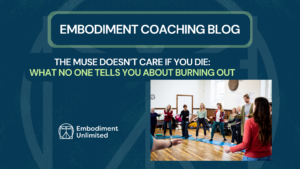Embodiment has become a buzzword in recent years, yet for many, its true meaning remains elusive. For coaches and professionals, understanding embodiment can offer transformative insights into personal growth, emotional intelligence, and authentic leadership.
This guide breaks down the concept, explores its practices, and highlights its relevance for modern living, drawing on a wealth of experience in disciplines such as martial arts, yoga, therapy, and dance.
What Is Embodiment?
At its heart, embodiment is about living in your body; living as a whole being. While the body is often viewed as a mere vessel or tool, embodiment invites us to experience it as an essential part of who we are. This goes beyond simple body awareness—it’s about inhabiting your body fully, experiencing life through it, being a body, and using it as a gateway for self-development.
Think of it as mindfulness, but instead of observing your body from a distance, you engage with it from within. It’s about the subjective experience of being a body, rather than just having one.
The Mind-Body Connection: Why It Matters
Our body and mind are inseparably linked. Physical postures, movements, and sensations directly influence emotions, thoughts, and even behaviours. For example:
- Standing tall can boost confidence and uplift your mood.
- Slouching might evoke feelings of fatigue or sadness.
As coaches, recognising this interplay allows us to better support clients in developing self-awareness, resilience, and a sense of groundedness.
Key Practices of Embodiment
Embodiment encompasses diverse practices that foster body awareness and growth. Here are some disciplines to explore:
- Yoga: Beyond the physical, yoga offers a pathway to self-awareness, balance, and inner peace.
- Conscious Dance: Encouraging spontaneous movement, these practices help connect emotion and motion.
- Martial Arts: Develop discipline, boundaries, and personal safety through embodied practice.
- Somatic Therapies: Western approaches like Feldenkrais or Alexander Technique integrate emotional healing with body awareness.
- Improvisation and Theatre: Enhance spontaneity and emotional expression through embodied acting techniques.
Why Coaches Should Care About Embodiment
Embodiment is more than just a personal wellness practice—it’s a critical skill for professional and personal success. Here’s why:
- Emotional Intelligence: Being attuned to your body fosters deeper emotional awareness, enabling you to navigate your feelings and support others effectively.
- Authentic Leadership: Leading from an embodied presence creates trust, connection, and impact.
- Improved Relationships: A strong sense of self-awareness enhances empathy and communication, essential for working with clients.
- Resilience and Self-Regulation: Embodied practices build the ability to stay centred under pressure—a vital skill in today’s fast-paced world.
Embodiment for Beginners: Where to Start
If you’re new to embodiment, here are practical steps to get started:
- Start Small: Try mindful breathing, gentle yoga, or even a daily walk to tune into your body.
- Find Joy: Choose practices you enjoy—anything that leaves you feeling more connected and grounded.
- Engage with Others: Join a class or workshop to share experiences and foster community.
- Embrace Nature: Spend time outdoors to deepen your sense of connection and calm.
Skills to Cultivate Through Embodiment
As you explore embodiment, focus on developing these essential skills:
- Awareness: Understand your physical state, emotions, and energy levels.
- Self-Regulation: Learn how to manage stress and maintain balance through body awareness.
- Empathy: Enhance your ability to read and respond to others through embodied presence.
Overcoming Challenges in Embodiment
The journey to embodiment isn’t without its hurdles. Be mindful of the following:
- Trauma Sensitivity: If past trauma arises, seek gentle practices and professional support to navigate safely.
- Finding the Right Fit: Experiment with different modalities and teachers to discover what resonates with you.
- Avoid Overwhelm: Prioritise self-care and don’t feel pressured to do everything at once.
The Takeaway: Embodiment as a Lifelong Journey
Embodiment isn’t just another wellness trend—it’s a profound tool for growth, connection, and transformation. By learning to live more fully in your body, you can unlock greater self-awareness, creativity, and joy, both in your personal life and professional practice.
Whether you’re a coach looking to deepen your emotional intelligence or simply curious about enhancing your well-being, embodiment offers a path worth exploring. Start small, stay curious, and enjoy the journey back to yourself.
Explore More
Curious to dive deeper? Explore resources, find a practice, or connect with a community at Embodiment Unlimited.
Become a certified embodiment coach by signing up for the Certification of Embodiment Coaching 2025: https://embodimentunlimited.com/cec/



